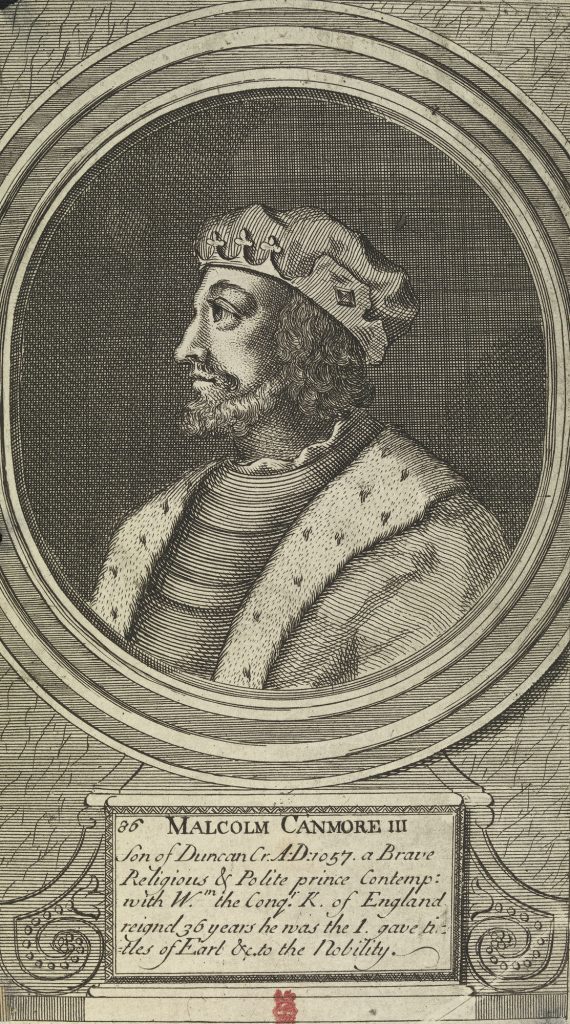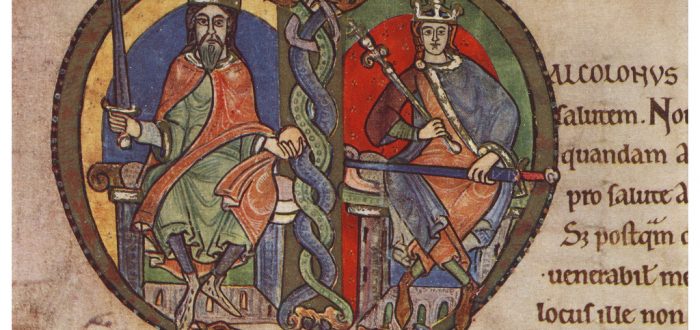Our History Lecturer, Dr Allan Kennedy, provides a brief summary of the long-standing resistance offered to the MacMalcolm kings of the 12th and 13th centuries by the rival Meic Uilleim family. This article first appeared as part of the ’10 Minutes On…’ column in History Scotland magazine, with whose kind permission it is republished here.

Malcom III, the vanquisher of MacBeth, came to the Scottish throne in 1058. The line he founded, variously known as the ‘Canmore’, ‘Dunkeld’ and ‘MacMalcolm’ dynasty, ruled Scotland until 1290, overseeing the country’s emergence as a mature high-medieval kingdom. But while enjoying a reputation for vigour and strength, the MacMalcolm kings did not rule unopposed. Resistance to their aggressive, expansionist policies was often widespread, particularly in outlying parts of Scotland, and probably their most formidable rival was another dynasty that, for more a century, curated an alternative claim to the crown – the Meic Uilleims.
The Meic Uilleim claim was rooted in the succession crisis precipitated by Malcolm III’s death in 1093. Although Malcolm’s eventual successors were three of his sons by his second wife, St Margaret – Kings Edgar (1097-1107), Alexander I (1107-24) and David I (1124-53) – the throne had in the interim been occupied briefly by Duncan II (r.1094), Malcolm’s son by his first wife, Ingibiorg.
But Duncan II had a son of his own, and although this heir, named William, seems to have been content to leave the kingship to his half-uncles, his descendants – styling themselves the ‘Meic Uilleims’ (Anglicised as ‘MacWilliams’) – were not so passive.
These later Meic Uilleims were able to press their claims because William himself had, prior to the death in the 1150s, built up a power-base in northern Scotland, possibly taking possession of the important earldom of Moray. When King William I (1165-1214) began tightening royal control over this region in the 1160s and 1170s, the Meic Uilleims were able to present themselves as both champions of Gaelic Scotland and guarantors of Moravian autonomy, and in this capacity they seem to have attracted considerable support from those who stood to lose out in the face of the king’s expanding power.
Meic Uilleim-led resistance may already have been gathering pace by the later 1170s, but it was in 1181 that Donald Meic Uilleim, taking advantage of the king’s temporary absence in France, launched a full-scale rising. He seems to have taken almost complete control of both Moray and Ross, and by 1186 government control in the north was so tenuous that the Meic Uilleims were able to launch a raid as far south as Coupar Angus. It took a huge royal effort, culminating in a battle at the unidentified site of ‘Mam Garvia’ in 1187, during which Donald himself was killed, to put down the rebellion.
The Meic Uilleims were not yet defeated, however. Donald’s sons, who had fled into exile following their father’s defeat, returned to Scotland in 1211 to renew the challenge. Several royal campaigns succeeded in capturing one son, Guthred, who was quickly executed, but the other, Donald Bàn, remained at large, and led a renewed push against the young Alexander II (1214-49) in 1214-5, again raising much of Ross and Moray. This time, it was the action of a rival regional magnate, Fercher mac an t-Sagairt, that undid the Meic Uilleims, and following his defeat of them, Fercher sent the heads of Donald Bàn and some of his main supporters southwards as a gift for the king.
The defeat of Donal Ban was not quite the end of the Meic Uilleim challenge. Despite the inexorable tightening of royal authority over the northern territories under Alexander II’s energetic leadership, sporadic disorders continued in Moray throughout the 1210s and 1220s, culminating in the burning of Abertarff castle, held by one of Alexander’s vassals, in 1228. The king rushed north in person to crush this latest insurgency, which he did with characteristic ruthlessness. By 1230, every remaining Meic Uilleim, including a baby girl whose brains were dashed out on the mercat cross of Forfar, had been killed, and a century-old challenge to the MacMalcolm kings was finally extinguished.
Further reading
M. Brown, The Wars of Scotland 1214-1371 (Edinburgh, 2004)
R.D. Oram, Alexander II: King of Scots, 1070-1230 (Edinburgh, 2011)
R. Andrew McDonald, Outlaws of Medieval Scotland: Challenges to the Canmore Kings, 1058-1266 (East Linton, 2003)


Comments are closed.